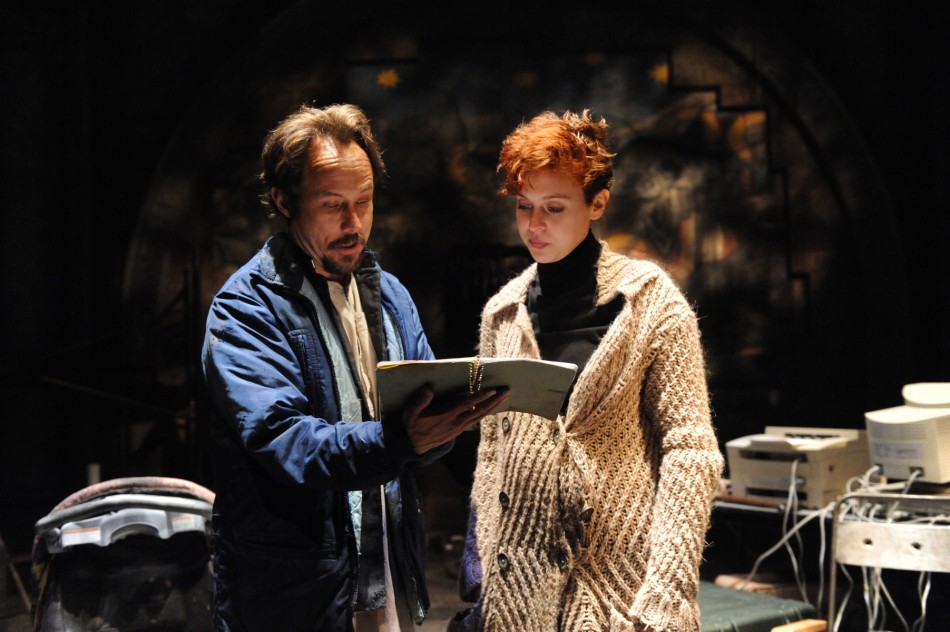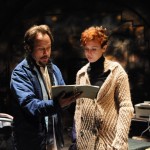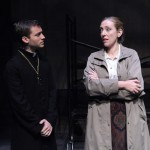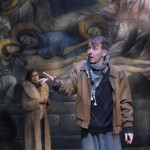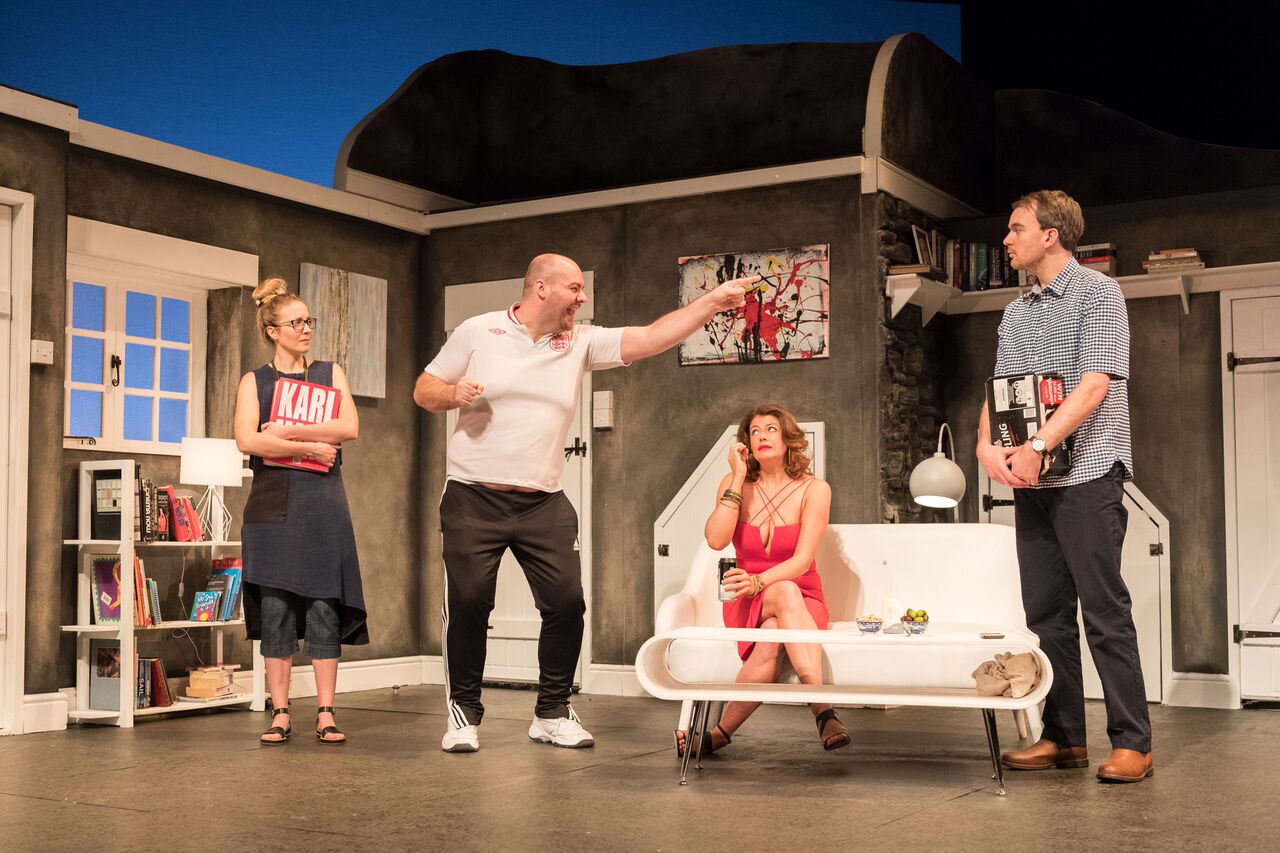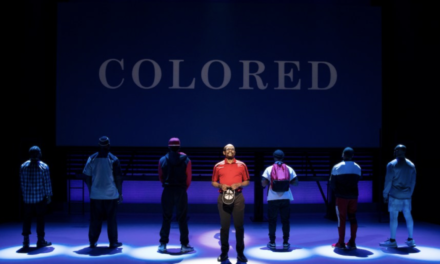NY Theater Review by JK Clarke
There are a couple of expressions that have been making the rounds on the Internet (through memes or hashtags), which express a disdain for what appear, ostensibly, to be petty issues. An example might be “first world problems,” which is used to identify something like, say, rude service at a high end boutique as offensive to complain about when there are people dying horrible deaths in war zones or perhaps starving in other parts of the world. The paradoxical counterpoint between a banal complaint with an example of true misery is, for many, a point of ire that should only be met with derision. This sort of moral relativism is the central theme of Potomac Theatre Project’s (PTP/NYC) production of David Edgar’s Pentecost, now playing through August 10 at the Atlantic Stage 2 in Chelsea.
Of course, it’s a lot more complex than that. In the opening of Pentecost we are introduced to Gabriella Pecs (the sharp Tosca Giustini), an art curator in an un-named south-east European country (which is just emerging, we are told, from 40 years behind the iron curtain); and Oliver Davenport (Jonathan Tindle), an English art historian. Mrs. Pecs has waylaid Davenport, bringing him to the basement of an abandoned, ancient Romanesque church. She wants to reveal to the great art expert her art-history changing discovery, a fresco that apparently pre-dates Middle-Ages fresco painter Giotto’s The Lamentation of Christ. Her discovery sets off enormous debates among art scholars (over the authenticity and provenance of the painting in a discussion that ranges from the physical/cultural (Arab or European) origins of materials used in the painting to mistranslated ancient texts—due to words with dual meanings—that end up altering long held historical assumptions) and legal disputes among state and various church officials (over the ownership of the piece, which could lead to huge tourism revenues and national pride). The debates are ugly and unseemly, but feel to those involved as though they are of earth-shattering importance. But everything is put into stark perspective when a multi-national band of refugees inadvertently storm the church basement and take the art scholars hostage.
The second act shifts the focus away from the so-called “first-world problems” by dint of our witnessing accounts of the plight of the hostage takers—asylum seekers who have real problems (Kurds whose families had been gassed in Iraq, a Palestinian/Kuwaiti with no safe place to live, a Roma (“gypsy”) family with no homeland or papers, etc.). Theirs are life and death scenarios that make the scholars’ disputes downright irrelevant. But even within that juxtaposition are in-depth discussions and debates over a society’s cultural values and its seeming need to impose them on other groups.
It is to director Cheryl Faraone’s and a tremendous cast’s great credit that Pentecost is not a difficult play to follow, for the subject matter is exceptionally complex and the detailed text is the sort that could probably be re-visited and studied at great length. This is heady theater which satisfies multiple interests: art history, politics, social discourse, academia, and more. But, here it has been made surprisingly accessible and entertaining. The presentation of all this discourse is clever, with an untold number of languages spoken, including entire discussions which we somehow completely get the gist of despite not understanding a single word. Giustini and Davenport’s conversations (as the two scholars who first discuss the painting) are informative and clear without being overly expository. As Leo Katz, the abrasive and controversial American, Jewish art historian, Alex Draper channels Richard Dreyfuss, and is a believable and completely recognizable character—we’ve all encountered this guy somewhere before; he’s the one who’s going to take a contrary stance no matter what the subject may be. Mari Vial-Golden as Yasmin, a Palestinian Kuwaiti is a frightening revolutionary radical type (bringing to mind 1960s American extremist groups like the SLA or the Weathermen) and manages to shift from being unlikeable to somewhat sympathetic. The ensemble, and it is an enormous cast of around 30, is solid and manages the melange of languages and cultures quite convincingly.
Pentecost is a play that is designed to toy with one’s emotions. It was written in the early 1990s and it is interesting to consider that the audience’s response to the the hostage-taking and the criticisms of western cultures was probably very different in a pre-9/11 world than it is today. Western awareness of the disdain many cultures (particularly those in the Middle East and eastern bloc countries) bear it has undergone a dramatic shift in the intervening twenty or so years. It is likely that an audience now has less sympathy for the hostage-takers than it did when the play was written. That’s one of the things that makes Pentecost special: it has the ability to endure contextual cultural changes and remain impactful and relevant. But, best of all, it’s a formidable piece that is accessible to all and leaves a lasting impact. One might even say it’s sort of like the discovery of an important and meaningful painting buried behind an ancient wall.
*Photos: Stan Barouh
Pentecost. Through August 10 at Potomac Theatre Project (PTP/NYC) at The Atlantic Stage 2, 330 W. 16th Street (between 8th and 9th Avenues). http://ptpnyc.org


